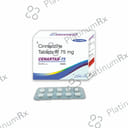Cinnarizine
Uses
Cinnarizine is used in the treatment of motion sickness, vertigo, and Meniere's disease.
How it Works
How Cinnarizine works Cinnarizine functions by inhibiting the constriction of blood vessels in the inner ear, thereby enhancing the microcirculation within the ear.
Side Effects
Common side effects of Cinnarizine include sleepiness, nausea, and weight gain.
Expert Advice
- Take it with food to avoid stomach upset.
- It may cause dizziness and sleepiness.
- Do not drive or engage in activities that require mental focus until you know how Cinnarizine affects you.
- Avoid alcohol while taking this medicine, as it may increase sleepiness.
- Stop taking the medicine if you experience:
- Yellowing of the skin
- Tiredness
- Fever
- Nausea
- Weakness
- Red, lumpy, and itchy rash
- Inform your doctor if you are pregnant, planning to conceive, or breastfeeding.
- Do not stop taking Cinnarizine without consulting your doctor first.
Related Medications
Cinnarizine 25mg

₹20.5

₹54.7
MRP ₹109.5
Cinnarizine 25mg

₹31

₹54.7
MRP ₹109.5
Cinnarizine 25mg

₹31

₹54.7
MRP ₹109.5
Cinnarizine 25mg

₹32

₹54.7
MRP ₹109.5
Cinnarizine 25mg

₹70

₹54.7
MRP ₹109.5
Cinnarizine 25mg

₹15

₹54.7
MRP ₹109.5
Cinnarizine 25mg

₹50

₹54.7
MRP ₹109.5
Cinnarizine 25mg

₹38

₹54.7
MRP ₹109.5
Cinnarizine 25mg

₹38

₹54.7
MRP ₹109.5
Cinnarizine 25mg

₹50

₹54.7
MRP ₹109.5
Cinnarizine 25mg

₹12.5

₹54.7
MRP ₹109.5
Cinnarizine 25mg

₹46.2

₹54.7
MRP ₹109.5
Cinnarizine 25mg

₹30

₹54.7
MRP ₹109.5
Cinnarizine 25mg

₹40

₹54.7
MRP ₹109.5
Cinnarizine 75mg

₹41.3
MRP ₹82.5
Cinnarizine 75mg

₹50

₹41.3
MRP ₹82.5
Cinnarizine 75mg

₹71.5

₹41.3
MRP ₹82.5
Cinnarizine 75mg

₹140

₹41.3
MRP ₹82.5
Cinnarizine 75mg

₹72

₹41.3
MRP ₹82.5
Cinnarizine 75mg

₹58

₹41.3
MRP ₹82.5
Cinnarizine 75mg

₹75

₹41.3
MRP ₹82.5
Cinnarizine 75mg

₹78.4

₹41.3
MRP ₹82.5
Cinnarizine 75mg

₹17.3
MRP ₹34.7
Cinnarizine

₹17.5
Cinnarizine 20mg

₹41
Flat ₹100 off on first app order | Use Code: APP100 |
Flat ₹100 off on first app order
USE CODE: APP100

Download Now